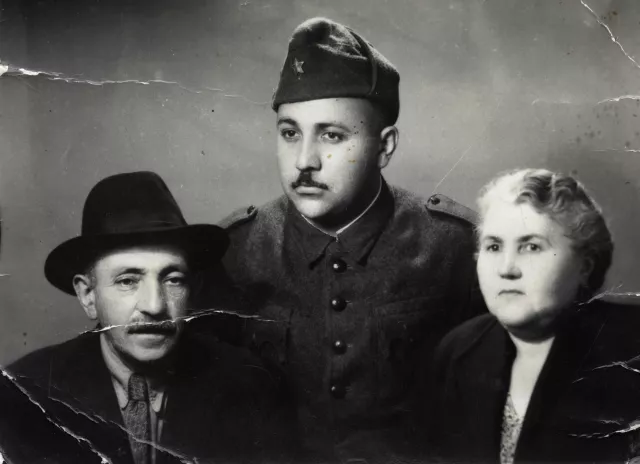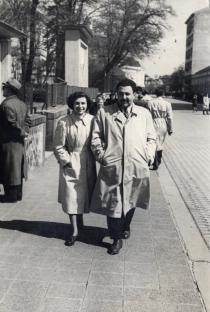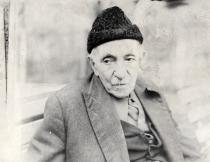This is a family photo with me as a soldier taken in Dupnitsa in the 1940s. My father, Mordohay Sabitay Madzhar, is first from left and my mother, Buka Yuda Madzhar (nee Komforti), is first from right.
My father was born in Dupnitsa in 1892. He inherited his father's gut processing trade, which had nothing to do with the kashrut; the guts were sold to Bulgarians who produced sausages. My father was a very kind man and was not strict; he never hit me. I remember that once he was very angry with me, and yet he didn't beat me. He was a kind-hearted man. He very much believed in people, he was kind of naive. He had many Bulgarian friends. That's why during the Law for the Protection of the Nation we didn't experience much hardship. We had friends in the villages and in town, who brought us flour and bread; there was a miller, who was a friend of my father. The baker also respected him.
My father was a well-known man and everyone was willing to help him. But sometimes his faith in people got him into trouble. Once he came to work in Sofia with a fellow man from Dupnitsa. They earned a lot of money, but his so-called partner cheated him and gave him nothing. My father was very kind, but maybe because of his job and his fellow workers, butchers, who are on the whole ruder, wild and unrestrained, he was very brave. I can?t say that he was rude, but he reacted very fast in dangerous situations.
My mother was born in 1894 in Dupnitsa. She didn't work; she took care of me, my sister and the house. She was the one who cooked. My grandmother also cooked sometimes, but since she helped my father with his work, my mother was in charge of the household chores. When she was young, she worked in the tobacco warehouses; she came from a very poor family and didn't go to school. Although our family was poor, my father earned enough money so that we would not be among the poorest ones. Most of the people in Dupnitsa lived in misery. Only my mother looked after us, and we never had a maid. She was a very good cook. My father would often bring some edible offal home from work and my mother made various meals with it.
When the fascist power fell on 9th September 1944, I was a barber. Since I was participating in the revolutionary movement in the town, I joined the army as a volunteer, because I was not yet 18 years old. This happened in October 1944. I took part in the war for the liberation of Yugoslavia. I was part of the Third Guards regiment commanded by Jelyu Demirevski. I was a platoon political commissioner and since I had some education I gave lectures to the soldiers and read them the newspapers. There were some horrible battles, one of them around Stracin [Macedonia]. The second phase of the war was in Hungary and I didn't want to be a volunteer any more as I wanted to finish my education. In January 1945 I was released from the army and continued my education in the trade high school in Sofia.
Leon Madzhar as a soldier
Share
Photos from this interviewee
The Centropa Collection at USHMM
The Centropa archive has been acquired by the United States Holocaust Memorial Museum in Washington, DC.
USHMM will soon offer a Special Collections page for Centropa.
Academics please note: USHMM can provide you with original language word-for-word transcripts and high resolution photographs. All publications should be credited: "From the Centropa Collection at the United States Memorial Museum in Washington, DC". Please contact collection [at] centropa.org.






























